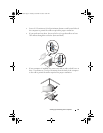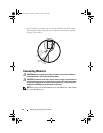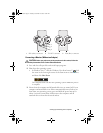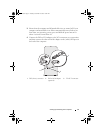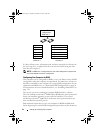
30 Setting Up and Using Your Computer
Changing the Display Settings
1
After you connect the monitor(s) or TV, turn on the computer.
The Microsoft
®
Windows
®
desktop displays on the primary monitor.
2
Enable extended desktop mode in the display settings. In extended
desktop mode, you can drag objects from one screen to the other,
effectively doubling the amount of viewable work space.
About Your RAID Configuration
This section provides an overview of the RAID configuration you may have
selected when you purchased your computer. There are several RAID
configurations available in the computer industry for different types of uses.
Your computer supports RAID level 0 and RAID level 1. A RAID level 0
configuration is recommended for high-performance programs or gaming,
and a RAID level 1 configuration is recommended for users who require a
high level of data integrity. For example, those in the digital photography and
audio industries.
NOTE: RAID levels do not represent a hierarchy. A RAID level 1 configuration is not
inherently better or worse than a RAID level 0 configuration.
The drives in a RAID configuration should be the same size in order to ensure
that the larger drive does not contain unallocated (and therefore unusable)
space.
RAID Level 0 Configuration
NOTICE: Because RAID level 0 configurations provide no data redundancy, a
failure of one drive results in the loss of all data (the data on the remaining drive is
also inaccessible). Therefore, ensure that you perform regular backups when you
use a RAID level 0 configuration.
A RAID level 0 configuration uses a storage technique known as data striping
to provide a high data access rate. Data striping is a method of writing
consecutive segments, or stripes, of data sequentially across the physical
drives to create a large virtual drive. Data striping allows one of the drives to
read data while the other drive is searching for and reading the next block.
book.book Page 30 Tuesday, November 27, 2007 10:29 AM




